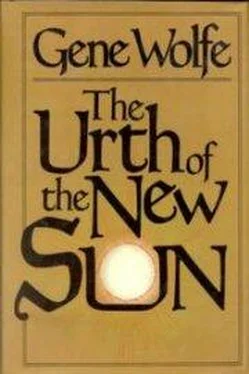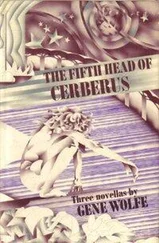“But I’m dead — not even here, dead back there on Tzadkiel’s ship.”
“Your twin lies dead there,” Barbatus told me. “As another lies dead here. I might say in passing that if he weren’t dead, we couldn’t have done what we did, because every living being is more than mere matter.” He paused and glanced toward Fainulimus for help, but received none. “What do you know of the anima?”
I thought then of Ava, and what she had said to me: “You’re a materialist, like all ignorant people. But your materialism doesn’t make materialism true.” Little Ava had died with Foila and the rest. “Nothing,” I muttered. “I know nothing of the anima.”
“In a way, it’s like a line of verse. Famulimus, what was the one you quoted to me?”
His wife sang, “Awake! for Morning in the Bowl of Night, Has flung the Stone that puts the Stars to Flight.”
“Yes,” I said. “I understand.”
Barbatus pointed. “Suppose I were to write those lines upon that wall — and then to write them again upon that other wall. Which would be the true lines?”
“Both,” I said. “And neither. The true lines are not writing, nor speech either. I can’t say what they are.”
“That is the way of the anima, as I understand it. It was written there.” He indicated the dead man. “Now it is written in you. When the light of the White Fountain touches Urth, it will be written there again. Yet the anima will not be erased in you by that writing. Unless—”
I waited for him to continue.
Ossipago said, “Unless you come too close. If you write a name in the dust and retrace it with your finger, there are not two names, but one. If two currents flow through a conductor, there is one current.”
While I stared in disbelief, Famulimus sang, “You came too near your double once, you know; that was here, in this poor town of stones. Then he was gone, and only you remained. Our eidolons are always of the dead. Have you not wondered why? Be warned!”
Barbatus nodded. “But as for our returning you to your own time, we can’t help you. Your green man knew more than we, perhaps; or at least he had more energy at his disposal. We’ll leave you food, water, and a light; but you’ll have to wait for the White Fountain. It shouldn’t be long, as Famulimus said.”
She had begun to fade into the past already, so that her song seemed to come from far away. “Do not destroy the corpse, Severian. However tempted you may be — be warned!”
Barbatus and Ossipago had faded while I watched Famulimus. When her voice was gone, there was no sound in the House of Apu-Punchau but his own faint breath.
Chapter LI — The Urth of the New Sun
FOR ALL that remained of that day I sat in the dark and cursed myself for a fool. The White Fountain would shine in the night sky, I knew, and everything the Hierodules had said implied it; yet I had failed to understand it until they had gone.
A hundred times I relived the rain-swept night when I had descended from the roof of this very structure to aid Hildegrin. How near had I come to Apu-Punchau before I had merged with him? Five cubits? Three ells? I could not be sure. But surely it was no mystery that Famulimus had told me not to try to destroy him; if I were to come near enough to strike, we would merge — and he, having deeper roots in this universe, would overwhelm me just as I would overwhelm him in the unimaginably distant future when I would journey to this place with Jolenta and Dorcas.
Yet if I had longed for the mysterious (as I certainly did not), there was riddle enough. The White Fountain shone already, that seemed certain, for without it I would not have been able to come to this ancient place or heal the sick. Why, then, had I been unable to travel the Corridors of Time as I had from Mount Typhon ? Two explanations seemed likely.
The first was simply that on Mount Typhon my whole being had been spurred by fear. We are strongest in a crisis, and Typhon’s soldiers had been coming for me, doubtless to kill me. Yet I faced another crisis now, for Apu-Punchau might rise and come toward me at any moment.
The second was that such power as I had received from the White Fountain was diminished by distance just as its light was. It must have been far nearer Urth in Typhon’s time than in Apu Paunchau’s; but if it were indeed thus diminished, the passing of one day would scarcely make a difference, and a day at most was the longest for which I, could hope, with my other self alive again and so near. I would have to escape as soon as I could, and wait elsewhere.
It was the longest day of my life. If I had been merely awaiting nightfall, I could have wandered in memory, recalling that marvelous evening when I had walked up the Water Way , the tales told in the Pelerines’ lazaretto, or the brief holiday that Valeria and I had once enjoyed beside the sea. As it was, I dared not; and whenever I relaxed my guard, I found my mind turned of its own accord to dreadful things. Again I endured my imprisonment in the jungle ziggurat by Vodalus, the year I had spent among the Ascians, my flight from the white wolves in the Secret House; and a thousand similiar terrors, until at last it seemed to me that a demon desired that I surrender my miserable existence to Apu-Punchau, and that the demon was myself.
Slowly the noises of the stone town died away. The light, which earlier had come from the wall nearest me, now penetrated the wall beyond the altar on which Apu-Punchau lay, cutting the gloom with blades of hammered gold thrust between the crevices.
At last it faded. I rose, stiff in every joint, and began to probe the wall for weaknesses.
It had been built of cyclopean stones, with smaller stones driven between them by workmen swinging huge wooden mauls. The small stones were wedged so tightly that I tested fifty or more before finding one that could be pried loose; and I knew that I would have to remove one of the great stones to make an opening through which I could pass.
Even the small stone required a watch at least of tugging and prying. I used a jasper-bladed knife to scrape away the mud around it, then broke that knife and three others trying to get it out. Once I abandoned the task in disgust and mounted the wall like a spider, hoping that the roof would supply an easier road to freedom, as the thatch had in the hall of the magicians. But the vaulted ceiling was as solid as the walls, and I dropped to the floor again to bloody my fingers on the loose stone.
Suddenly, when it seemed certain it could never be freed, it slipped clattering to the floor. For five long breaths I waited paralyzed, fearing that Apu-Punchau would wake. As far as I could judge, he never stirred.
Yet something else was stirring. The immense stone above tilted ever so gently to the left. Dried mud cracked, sounding as loud as the breaking of river ice in the stillness, and came rattling down around me.
I stepped back. There was a grinding, as of a mill, and a second shower of mud. I moved to one side and the great stone fell with a crash, leaving behind it a rough black circle full of stars.
I looked at one and knew myself a pinprick of light nearly lost in the opaline haze of ten thousand more.
No doubt I should have waited — certainly it was possible that a dozen more great stones might follow the first. I did not. A leap carried me onto the fallen one, another into the aperture in the wall, and a third into the street. The noise had wakened the people, of course; I heard their angry voices, saw the faint red glow of their fires seep past their doors as wives puffed dying embers while husbands groped for spears and toothed wardubs.
I did not care. All about me stretched the Corridors of Time, waving meadows roofed with the lowering sky of Time and whisperous with the brooks that ripple from the most supernal universe of all to the least.
Читать дальше










